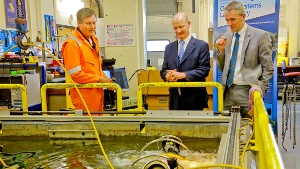Sep 10 2013
A unique £7.2m partnership researching the future of robotics was the focus of a visit by Universities and Science Minister the Rt Hon David Willets MP to Heriot-Watt University.
 Left to right: Len McLean, Ocean Systems Laboratory Technician, Science Minister David Willets and Professor Dave Lane.
Left to right: Len McLean, Ocean Systems Laboratory Technician, Science Minister David Willets and Professor Dave Lane.
Multi-disciplinary research
ROBOTARIUM is a new cutting edge facility run by EDU-RAS, a partnership between Heriot-Watt University and the University of Edinburgh and incorporates 50 world-leading investigators from 16 cross disciplinary research groups plus 30 industrial partners.
The multi-disciplinary team assembles world-leading expertise including robotics, vision, perception, cognition, human-interaction, artificial intelligence, micro and nano-systems, soft embodiment, bio-inspiration, neural computation, dependable systems and multi-core computing, with the aim of producing robots which can act independently of human control.
It is estimated that by 2025 such advanced robotic and autonomous systems (RAS) could have a worldwide economic impact of $1.7 trillion and $4.5 trillion a year, with enormous impact in sectors including oil and gas, defence, renewable energy, healthcare, assisted living, transport, space automotive, manufacturing, nuclear, digital media and education.
Producing a new generation of 'innovation-ready' researchers
During his visit the Minister was shown the alliance of strengths in Robotics and Autonomous Systems at Heriot-Watt and Edinburgh Universities and the creation of an international centre of excellence producing 'innovation-ready' technology and graduates, as well as how the ROBOTARIUM £6m capital equipment award from the Engineering and Physical Sciences Research Council (EPSRC) forms part of the plans, along with over a million pounds of funding from industry.
Universities and Science Minister David Willets said, “By backing new technologies and giving people the skills they need to succeed, collaborations between universities and business will maintain the UK’s world class science and research base, ensuring the UK stays ahead in the global race. As one of the eight great technologies, robotics and autonomous systems has the potential to revolutionise the way in which we do business across a range of sectors including space, manufacturing, renewable energy and transport systems.”
Professor David M Lane, Professor of Autonomous Systems Engineering, School of Engineering and Physical Sciences at Heriot-Watt , said, "Robots which can act in partnership with humans, that can learn, interact and take decisions, will revolutionise our economy and society over the next 20 years.”
"We are working to help the UK realise its industrial potential in this revolution, by producing a new generation of ‘innovation-ready’ postgraduate researchers who are both technically skilled and market aware, fully prepared to lead UK innovation in this exciting and challenging field."
During his visit the Minister visited Heriot-Watt's Ocean Systems laboratory, which innovates, applies and teaches world class advances in autonomous systems, sensor modelling/processing, and underwater acoustic system theory/design for offshore, marine science, renewable energy and security applications. He saw autonomous underwater vehicles in action and had a chance to pilot a remotely operated vehicle under water.